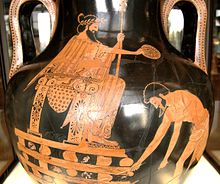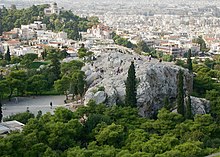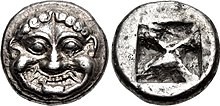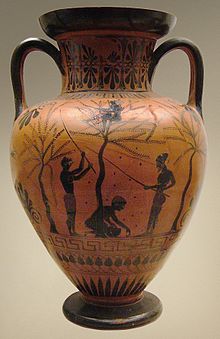|
Solon
Solon (Ancient Greek: Σόλων; c. 630 – c. 560 BC)[1] was an archaic Athenian statesman, lawmaker, political philosopher, and poet. He is one of the Seven Sages of Greece and credited with laying the foundations for Athenian democracy.[2][3][4] Solon's efforts to legislate against political, economic and moral decline[5] resulted in his constitutional reform overturning most of Draco's laws. Solon's reforms included debt relief later known and celebrated among Athenians as the seisachtheia (shaking off of burdens). He is described by Aristotle in the Athenian Constitution as "the first people's champion". Demosthenes credited Solon's reforms with starting a golden age. Modern knowledge of Solon is limited by the fact that his works only survive in fragments and appear to feature interpolations by later authors. It is further limited by the general paucity of documentary and archaeological evidence covering Athens in the early 6th century BC.[6] Ancient authors such as Philo of Alexandria,[7] Herodotus, and Plutarch are the main sources, but wrote about Solon long after his death. Fourth-century BC orators, such as Aeschines, tended to attribute to Solon all the laws of their own, much later times.[5][8] BiographyEarly life and ancestry Solon was born in Athens around 630 BC.[1] His family was distinguished in Attica as they belonged to a noble or Eupatrid clan.[9] Solon's father was probably Execestides. If so, his lineage could be traced back to Codrus, the last King of Athens.[10] According to Diogenes Laërtius, he had a brother named Dropides, who was an ancestor (six generations removed) of Plato.[11] According to Plutarch, Solon was related to the tyrant Pisistratus, for their mothers were cousins.[12] Solon was eventually drawn into the unaristocratic pursuit of commerce.[13] Defeat of MegaraWhen Athens and its neighbor and rival in the Saronic Gulf, Megara, were contesting the possession of Salamis, Solon was made leader of the Athenian forces. After repeated disasters, Solon was able to improve the morale of his troops through a nationalist poem he wrote about the island. Supported by Pisistratus, he defeated the Megarians either by means of a cunning trick[14] or more directly through heroic battle around 595 BC.[15] The Megarians, however, refused to give up their claim. The dispute was referred to the Spartans, who eventually awarded possession of the island to Athens on the strength of the case that Solon put to them.[16] Plutarch professes admiration of Solon's elegy.[14] The same poem was said by Diogenes Laërtius to have stirred Athenians more than any other verses that Solon wrote:
One fragment describes assorted breads and cakes: [18]
 ArchonshipAccording to Diogenes Laertius, in 594 BC, Solon was chosen archon, or chief magistrate.[19] Solon repealed all of Draco's laws except those relating to homicide.[20] During Solon's time, many Greek city-states had seen the emergence of tyrants, opportunistic noblemen who had taken power on behalf of sectional interests.[b] Solon was described by Plutarch as having been temporarily awarded autocratic powers by Athenian citizens on the grounds that he had the wisdom to sort out their differences for them in a peaceful and equitable manner.[21] Some modern scholars believe these powers were in fact granted some years after Solon had been archon, when he would have been a member of the Areopagus and probably a more respected statesman by his peers.[22][23][24] As archon, Solon discussed his intended reforms with some friends. Knowing that he was about to cancel all debts, these friends took out loans and promptly bought some land. Suspected of complicity, Solon complied with his own law and released his own debtors, amounting to five talents (or 15 according to some sources). His friends never repaid their debts.[25] Travels After completing his work of reform, Solon surrendered his extraordinary authority and traveled abroad for ten years, so that the Athenians could not induce him to repeal any of his laws.[26][c] Within four years of Solon's departure, the old social rifts re-appeared, but with some new complications. There were irregularities in the new governmental procedures, elected officials sometimes refused to stand down from their posts and occasionally important posts were left vacant. It has even been said that some people blamed Solon for their troubles.[32] Eventually one of Solon's relatives, Pisistratus, ended the factionalism by force, thus instituting an unconstitutionally gained tyranny. In Plutarch's account, Solon accused Athenians of stupidity and cowardice for allowing this to happen.[33] Solon's first stop in his travels was Egypt. There, according to Herodotus, he visited the Pharaoh of Egypt, Amasis II.[34] According to Plutarch, he spent some time and discussed philosophy with two Egyptian priests, Psenophis of Heliopolis and Sonchis of Sais.[35] A character in two of Plato's dialogues, Timaeus and Critias, claims Solon visited Neith's temple at Sais and received from the priests there an account of the history of Atlantis. Next, Solon sailed to Cyprus, where he oversaw the construction of a new capital for a local king, in gratitude for which the king named it Soloi.[35]  Solon's travels finally brought him to Sardis, capital of Lydia. According to Herodotus and Plutarch, he met with Croesus and gave the Lydian king advice, which Croesus failed to appreciate until it was too late. Croesus had considered himself to be the happiest man alive and Solon had advised him, "Count no man happy until he be dead." The reasoning was that at any minute, fortune might turn on even the happiest man and make his life miserable. It was only after he had lost his kingdom to the Persian king Cyrus, while awaiting execution, that Croesus acknowledged the wisdom of Solon's advice.[36][37] Death and legacyAfter his return to Athens, Solon became a staunch opponent of Pisistratus. In protest, and as an example to others, Solon stood outside his own home in full armour, urging all who passed to resist the machinations of the would-be tyrant. His efforts were in vain. Solon died shortly after Pisistratus usurped by force the autocratic power that Athens had once freely bestowed upon him.[38] Solon died in Cyprus around the age of 70[citation needed] and, in accordance with his will, his ashes were scattered around Salamis, the island where he was born.[39][40] Pausanias listed Solon among the Seven Sages, whose aphorisms adorned Apollo's temple in Delphi.[41] Stobaeus in the Florilegium relates a story about a symposium where Solon's young nephew was singing a poem of Sappho's: Solon, upon hearing the song, asked the boy to teach him to sing it. When someone asked, "Why should you waste your time on it?", Solon replied, "ἵνα μαθὼν αὐτὸ ἀποθάνω", "So that I may learn it before I die."[42] Ammianus Marcellinus, however, told a similar story about Socrates and the poet Stesichorus, quoting the philosopher's rapture in almost identical terms: ut aliquid sciens amplius e vita discedam,[43] meaning "in order to leave life knowing a little more". Historical rivalries The social and political upheavals that characterized Athens in Solon's time have been variously interpreted by historians from ancient times to the present day. The historical account of Solon's Athens has evolved over many centuries into a set of contradictory stories or a complex story that might be interpreted in a variety of ways. As further evidence accumulates, and as historians continue to debate the issues, Solon's motivations and the intentions behind his reforms will continue to attract speculation.[44] Two contemporary historians have identified three distinct historical accounts of Solon's Athens, emphasizing quite different rivalries: economic and/or ideological rivalry, regional rivalry, and rivalry between aristocratic clans.[45][46] These different accounts provide a convenient basis for an overview of the issues involved. Economic and ideologicalEconomic and ideological rivalry is a common theme in ancient sources. This sort of account emerges from Solon's poems, in which he casts himself in the role of a noble mediator between two intemperate and unruly factions. This same account is substantially taken up about three centuries later by the author of the Aristotelian Athenaion Politeia but with an interesting variation:
Here Solon is presented as a partisan in a democratic cause whereas, judged from the viewpoint of his own poems, he was instead a mediator between rival factions. A still more significant variation in the ancient historical account appears in the writing of Plutarch in the late 1st – early 2nd century AD:
RegionalRegional rivalry is a theme commonly found among modern scholars.[49][50][51][52] "The new picture which emerged was one of strife between regional groups, united by local loyalties and led by wealthy landowners. Their goal was to take control of the central government at Athens and with it dominate over their rivals from other districts of Attica."[53] ClanRivalry between clans is a theme recently developed by some scholars, based on an appreciation of the political significance of kinship groupings.[53][45][56][57][58][59] According to this account, bonds of kinship rather than local loyalties were the decisive influence on events in archaic Athens. An Athenian belonged not only to a phyle or tribe and one of its subdivisions, the phratry or brotherhood, but also to an extended family, clan or genos. It has been argued that these interconnecting units of kinship reinforced a hierarchic structure with aristocratic clans at the top.[45][46] Thus rivalries between aristocratic clans could engage all levels of society irrespective of any regional ties. In that case, the struggle between rich and poor was the struggle between powerful aristocrats and the weaker affiliates of their rivals or perhaps even with their own rebellious affiliates. Solon's reforms Solon's laws were inscribed on axones, large wooden slabs or cylinders attached to a series of axles that stood upright in the Prytaneion.[60][61][d] Originally the axones recorded laws enacted by Draco in the late 7th century (traditionally 621 BC). Nothing of Draco's codification has survived except for a law relating to homicide, yet there is consensus among scholars that it did not amount to anything like a constitution.[62][63] During his visit to Athens, Pausanias, the 2nd century AD geographer reported that the inscribed laws of Solon were still displayed by the Prytaneion.[64] Fragments of the axones were still visible in Plutarch's time[28] but today the only records we have of Solon's laws are fragmentary quotes and comments in literary sources such as those written by Plutarch himself. Moreover, the language of his laws was archaic even by the standards of the fifth century and this caused interpretation problems for ancient commentators.[65] Modern scholars doubt the reliability of these sources and our knowledge of Solon's legislation is therefore actually very limited in its details.[citation needed] Generally, Solon's reforms appear to have been constitutional, economic, moral, and sexual in their scope. This distinction, though somewhat artificial, does at least provide a convenient framework within which to consider the laws that have been attributed to Solon. Some short-term consequences of his reforms are considered at the end of the section. Constitutional Depending on how we interpret the historical facts known to us, Solon's constitutional reforms were either a radical anticipation of democratic government, or they merely provided a plutocratic flavour to a stubbornly aristocratic regime, or else the truth lies somewhere between these two extremes.[e] Before Solon's reforms, the Athenian state was administered by nine archons appointed or elected annually by the Areopagus on the basis of noble birth and wealth.[66][67][f] There was an assembly of Athenian citizens (the Ekklesia) but the lowest class (the Thetes) was not admitted and its deliberative procedures were controlled by the nobles.[70] There therefore seemed to be no means by which an archon could be called to account for breach of oath unless the Areopagus favoured his prosecution. According to the Athenian Constitution, Solon legislated for all citizens to be admitted into the Ekklesia[71] and for a court (the Heliaia) to be formed from all the citizens.[72] The Heliaia appears to have been the Ekklesia, or some representative portion of it, sitting as a jury.[73][74] By giving common people the power not only to elect officials but also to call them to account, Solon appears to have established the foundations of a true republic.[g] ClassesThere is consensus among scholars that Solon lowered the requirements – those that existed in terms of financial and social qualifications – which applied to election to public office. The Solonian constitution divided citizens into four political classes defined according to assessable property[71][80] a classification that might previously have served the state for military or taxation purposes only.[81] The standard unit for this assessment was one medimnos (approximately 12 gallons) of cereals and yet the kind of classification set out below might be considered too simplistic to be historically accurate.[82]
According to the Athenian Constitution, only the pentakosiomedimnoi were eligible for election to high office as archons and therefore only they gained admission into the Areopagus.[83] A modern view affords the same privilege to the hippeis.[84] The top three classes were eligible for a variety of lesser posts and only the thetes were excluded from all public office. EconomicThe real motives behind Solon's economic reforms are as questionable as his real motives for constitutional reform. Were the poor being forced to serve the needs of a changing economy, was the economy being reformed to serve the needs of the poor, or were Solon's policies the manifestation of a struggle taking place between poorer citizens and the aristocrats? Solon's economic reforms need to be understood in the context of the primitive, subsistence economy that prevailed both before and after his time. Most Athenians were still living in rural settlements right up to the Peloponnesian War.[54] Opportunities for trade even within the Athenian borders were limited. The typical farming family, even in classical times, barely produced enough to satisfy its own needs.[85] Opportunities for international trade were minimal. It has been estimated that, even in Roman times, goods rose 40% in value for every 100 miles they were carried over land, but only 1.3% for the same distance were they carried by ship[86] and yet there is no evidence that Athens possessed any merchant ships until around 525 BC.[87] Until then, the narrow warship doubled as a cargo vessel. Athens, like other Greek city states in the 7th century BC, was faced with increasing population pressures[88] and by about 525 BC it was able to feed itself only in good years.[89]  Solon's reforms can thus be seen to have taken place at a crucial period of economic transition, when a subsistence rural economy increasingly required the support of a nascent commercial sector. The specific economic reforms credited to Solon are these: 
CoinageIt is generally assumed, on the authority of ancient commentators,[95][96] that Solon also reformed the Athenian coinage. However, recent numismatic studies now lead to the conclusion that Athens probably had no coinage until around 560 BC, well after Solon's reforms.[97] Nevertheless, there are now reasons to suggest[98] that monetization had already begun before Solon's reforms. By the early sixth century the Athenians were using silver in the form of a variety of bullion silver pieces for monetary payments.[99] Drachma and obol as a term of bullion value had already been adopted, although the corresponding standard weights were probably unstable.[100] Foreign trade Solon's economic reforms succeeded in stimulating foreign trade. Athenian black-figure pottery was exported in increasing quantities and good quality throughout the Aegean between 600 BC and 560 BC, a success story that coincided with a decline in trade in Corinthian pottery.[2] The ban on the export of grain might be understood as a relief measure for the benefit of the poor. However, the encouragement of olive production for export could actually have led to increased hardship for many Athenians to the extent that it led to a reduction in the amount of land dedicated to grain. Moreover, an olive tree produces no fruit for the first six years[101] (but farmers' difficulty of lasting until payback may also give rise to a mercantilist argument in favour of supporting them through that, since the British case illustrates that "One domestic policy that had a lasting impact was the conversion of 'waste lands' to agricultural use. Mercantilists felt that to maximize a nation's power all land and resources had to be used to their utmost"). MoralIn his poems, Solon portrays Athens as being under threat from the unrestrained greed and arrogance of its citizens.[102] Even the earth (Gaia), the mighty mother of the gods, had been enslaved.[103] The visible symbol of this perversion of the natural and social order was a boundary marker called a horos, a wooden or stone pillar indicating that a farmer was in debt or under contractual obligation to someone else, either a noble patron or a creditor.[104] SeisachtheiaUp until Solon's time, land was the inalienable property of a family or clan[105] and it could not be sold or mortgaged. This was no disadvantage to a clan with large landholdings since it could always rent out farms in a sharecropping system. A family struggling on a small farm however could not use the farm as security for a loan even if it owned the farm. Instead the farmer would have to offer himself and his family as security, providing some form of slave labour in lieu of repayment. Equally, a family might voluntarily pledge part of its farm income or labour to a powerful clan in return for its protection. Farmers subject to these sorts of arrangements were loosely known as hektemoroi[106] indicating that they either paid or kept a sixth of a farm's annual yield.[107][108][109] In the event of 'bankruptcy', or failure to honour the contract stipulated by the horoi, farmers and their families could in fact be sold into slavery. Solon's reform of these injustices was later known and celebrated among Athenians as the seisachtheia (shaking off of burdens).[110][111] As with all his reforms, there is considerable scholarly debate about its real significance. Many scholars are content to accept the account given by the ancient sources, interpreting it as a cancellation of debts, while others interpret it as the abolition of a type of feudal relationship, and some prefer to explore new possibilities for interpretation.[4] The reforms included:
The removal of the horoi clearly provided immediate economic relief for the most oppressed group in Attica, and it also brought an immediate end to the enslavement of Athenians by their countrymen. Some Athenians had already been sold into slavery abroad and some had fled abroad to escape enslavement – Solon proudly records in verse the return of this diaspora.[113] It has been cynically observed, however, that few of these unfortunates were likely to have been recovered.[114] It has been observed also that the seisachtheia not only removed slavery and accumulated debt but may also have removed the ordinary farmer's only means of obtaining further credit.[115] The seisachtheia however was merely one set of reforms within a broader agenda of moral reformation. Other reforms included:
Demosthenes claimed that the city's subsequent golden age included "personal modesty and frugality" among the Athenian aristocracy.[125] SexualAs a regulator of Athenian society, Solon, according to some authors, also formalized its sexual mores. According to a surviving fragment from a work ("Brothers") by the comic playwright Philemon,[126] Solon established publicly funded brothels at Athens in order to "democratize" the availability of sexual pleasure.[127] While the veracity of this comic account is open to doubt, at least one modern author considers it significant that in Classical Athens, three hundred or so years after the death of Solon, there existed a discourse that associated his reforms with an increased availability of heterosexual contacts.[128] Ancient authors also say that Solon regulated pederastic relationships in Athens; this has been presented as an adaptation of custom to the new structure of the polis.[129][130] According to various authors, ancient lawgivers (and therefore Solon by implication) drew up a set of laws that were intended to promote and safeguard the institution of pederasty and to control abuses against freeborn boys. In particular, the orator Aeschines cites laws excluding slaves from wrestling halls and forbidding them to enter pederastic relationships with the sons of citizens.[131] Accounts of Solon's laws by 4th century orators like Aeschines, however, are considered unreliable for a number of reasons;[8][132][133]
Besides the alleged legislative aspect of Solon's involvement with pederasty, there were also suggestions of personal involvement. Ancient readers concluded, based on his own erotic poetry, that Solon himself had a preference for boys.[135] According to some ancient authors Solon had taken the future tyrant Pisistratus as his eromenos. Aristotle, writing around 330 BC, attempted to refute that belief, claiming that "those are manifestly talking nonsense who pretend that Solon was the lover of Pisistratus, for their ages do not admit of it", as Solon was about thirty years older than Pisistratus.[136] Nevertheless, the tradition persisted. Four centuries later Plutarch ignored Aristotle's skepticism[137] and recorded the following anecdote, supplemented with his own conjectures:
A century after Plutarch, Aelian also said that Pisistratus had been Solon's eromenos. Despite its persistence, however, it is not known whether the account is historical or fabricated. It has been suggested that the tradition presenting a peaceful and happy coexistence between Solon and Pisistratus was cultivated during the latter's dominion, in order to legitimize his own rule, as well as that of his sons. Whatever its source, later generations lent credence to the narrative.[139] Solon's presumed pederastic desire was thought in antiquity to have found expression also in his poetry, which is today represented only in a few surviving fragments.[140][141] The authenticity of all the poetic fragments attributed to Solon is however uncertain – in particular, pederastic aphorisms ascribed by some ancient sources to Solon have been ascribed by other sources to Theognis instead.[142] Poems It is recorded that Solon wrote poetry for pleasure, as patriotic propaganda, and in defence of his constitutional reform. Solon's verses have come down to us in fragmentary quotations by ancient authors such as Plutarch and Demosthenes,[143] who used them to illustrate their own arguments. It is possible that some fragments have been wrongly attributed to him[142] and some scholars have detected interpolations by later authors.[144] He was also the first citizen of Athens to reference the goddess Athena (fr. 4.1–4).[145] The literary merit of Solon's verse is generally considered unexceptional. Solon's poetry can be said to appear 'self-righteous' and 'pompous' at times[146] and he once composed an elegy with moral advice for a more gifted elegiac poet, Mimnermus. Most of the extant verses show him writing in the role of a political activist determined to assert personal authority and leadership. They have been described by the German classicist Wilamowitz as a "versified harangue" (Eine Volksrede in Versen).[147] According to Plutarch,[148] however, Solon originally wrote poetry for amusement, discussing pleasure in a popular rather than philosophical way. Solon's elegiac style is said to have been influenced by the example of Tyrtaeus.[149] He also wrote iambic and trochaic verses, which, according to one modern scholar,[150] are livelier and more direct than his elegies and possibly paved the way for the iambics of Athenian drama. Solon's verses are mainly significant for historical rather than aesthetic reasons, as a personal record of his reforms and attitudes. However, poetry is not an ideal genre for communicating facts and very little detailed information can be derived from the surviving fragments.[151] According to Solon the poet, Solon the reformer was a voice for political moderation in Athens at a time when his fellow citizens were increasingly polarized by social and economic differences:
Here translated by the English poet John Dryden, Solon's words define a 'moral high ground' where differences between rich and poor can be reconciled or maybe just ignored. His poetry indicates that he attempted to use his extraordinary legislative powers to establish a peaceful settlement between the country's rival factions:
His attempts evidently were misunderstood:
See also
Notes
References
Bibliography
Collections of Solon's surviving verses
Collections of Solon's laws
Further reading
External linksWikiquote has quotations related to Solon. Wikimedia Commons has media related to Solon.
|
||||||||||||||||||

